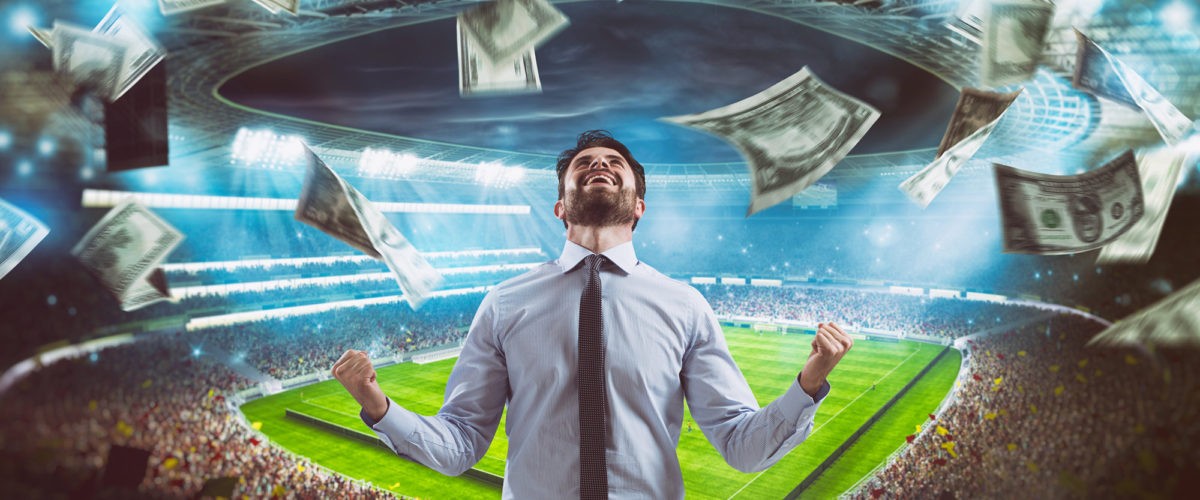I love a good side hustle. I have a job I enjoy, but one of my favorite things about it is that I often have the flexibility to explore other opportunities in my free time, such as writing for Baptist News Global. I also am a rabid sports fan. I am that obnoxious person who says “we” when discussing my favorite teams.
So in 2017, when the Supreme Court ruled that it was unconstitutional to have a federal ban on sports gambling outside of Las Vegas, I was initially thrilled. Making money just by doing what I enjoy the most would be anyone’s dream. Now, however, it seems almost impossible to interact with sports without being inundated with content and advertising that focuses on the gambling side of things.
As of this writing, 34 states have approved sports gambling, and 43 allow daily fantasy sports contests, also known as DFS. In a few short years, legal sports gambling has grown into a billion-dollar industry, and the trend is decidedly toward further legalization, which has led to a steady climb in the aforementioned content and advertising.
As a participant in this industry, I have come to learn exactly how rare it is that I’ve been successful with my betting, but I also have witnessed firsthand the darker side of the industry and the many lives that have been damaged by it.
“As a Christian and a sports gambler, I think it is important to reexamine the issue with a little more nuance.”
It is fair to say that, throughout the church’s history, the Christian perspective on gambling has traditionally been, “Don’t.” But as a Christian and a sports gambler, I think it is important to reexamine the issue with a little more nuance, especially with sports gambling’s growing influence and popularity.
Much of my analysis could apply to all types of gambling, but I am going to specifically focus on sports gambling for three reasons: sports gambling is growing extremely quickly, sports gambling seems to have a more positive public image than other types of gambling, and sports gambling is where the bulk of my personal experience lies.
Is sports gambling immoral?
Sports gambling is predicting the future performance of an entity, based on publicly available information, and earning or losing money based on the accuracy of your predictions. There is nothing inherently immoral about that; it is no different than investing in the stock market. In fact, you could take the analogy further: In both cases, you also get in serious trouble if you are too closely affiliated with the entity whose performance you are trying to predict (Martha Stewart on one hand, Pete Rose on the other).
And yet stock market investment is prudent and sensible, while gambling is a life-ruining vice. I think our difference in perception comes down to two things — the expected value of the activity, and the neurological impact.
Expected value
Corporate stocks create value. A company sells stock to raise money and uses that money to develop new products and create new jobs. As these companies grow, more money begins flowing through the economy, and the general trend of the economy points upward.
“If you are an average stock investor, you make a healthy profit almost every year.”
To put it simply, it is not a zero-sum game. It is not only possible for everyone to win; it is actually pretty likely. If you are an average stock investor, you make a healthy profit almost every year. In fact, if you bought into the S&P 500 at the highest point in the market in 2007, right before the market collapsed in 2008 due to the financial crisis, and you did nothing else, today you would have just about tripled your money.
The expected value of sports gambling, however, is always negative. Usually, you risk about $110 to win $100, so if you are an average sports gambler, you lose $5 for every $100 bet you make. If you are really good, and you win 52% of the time … you still lose money.
It is extremely rare that anyone can be so good that they make a profit placing bets at a sportsbook. Many “professional sports gamblers” really make their money by being touts. A tout holds themselves out as an expert, and then regular people who want to gamble but do not have the expertise will pay to be told which teams to bet on. The bets touts recommend usually just about break even, maybe a little bit up or down over a given time horizon, but the fees are the real prize for them. Touts also often partner with a casino, agreeing to direct their traffic to that casino’s sportsbook for another fee.
All of this “economic activity” is parasitic; it does not benefit the overall economy the way other economic activity can. The casinos profit from the touts, the touts profit from the casinos, but mostly, both of them profit from the unsuspecting public who is seduced by the constant stream of advertising about the wonders of sports gambling — advertising funded by losing bets.
Maybe the sportsbook hires more employees, or expands, or pays even more advertising firms, which could have some economic impact. But mostly the money is used to attract new hosts for the parasite, because they know once you try it, you may never stop, which brings us to our next topic.
Neurological impact
Gambling has a physical effect on the dopamine pathways inside our brains, similar to a drug addiction. The mesolimbic dopamine pathway affects the way we create memories, allowing strong, emotional stimuli (like gambling or addictive substances) to form privileged memories that can stay with us our entire lives.
“Gambling has a physical effect on the dopamine pathways inside our brains, similar to a drug addiction.”
These can cause cravings and risk relapses even after years of abstinence from the behavior, which is why Alcoholics Anonymous members always refer to themselves as “recovering” and never “recovered.” A closely related dopamine pathway, the mesocorticolimbic circuit, also affects the part of the brain responsible for evaluating the future and balancing immediate rewards against long-term consequences. This causes a gambler to slip into more and more compulsive behavior without recognizing the harm it could cause or even recognizing it as compulsive behavior.
This is especially malicious because studies have shown that, while pathological gamblers and non-pathological gamblers have an identical dopamine release when winning money, pathological gamblers get a similar dopamine release even when losing money; non-pathological gamblers do not. This is because the “rush” of gambling becomes tied to the uncertainty and anticipation more than the outcome. According to animal studies, the brain changes that are caused by this kind of uncertainty also can make the subject more apt to crave addictive drugs.
Understanding the physical changes in the brain makes it clear how a vicious cycle can develop. Over time, cravings get stronger, the brain loses the ability to recognize the red flags and eventually loses the ability even to care about the outcome.
To return to my analogy, there are a few reasons gambling has these neurological effects, while trading stocks typically does not. With gambling, there is an immediacy and instant gratification that is atypical of the stock market. You know in a matter of days or hours if your bet won or lost, but you would have to wait months to meaningfully analyze a stock’s performance. Gambling also usually is an all-or-nothing proposition. If the stock market moved up or down 5% in a day, we would call that extreme volatility. The outcome of a bet leaves you up or down 100% on that bet.
These factors combine to make gambling more emotional, more exciting and therefore more likely to affect the dopamine release mechanisms in the brain.
But daily fantasy is just harmless fun, right?
DFS is a relatively new offshoot of this burgeoning industry. Season-long fantasy leagues have been around since before the internet, when fantasy commissioners had to scour the box scores of newspapers and use snail mail to correspond with league members.

(123rf.com)
The internet has, of course, made this much easier, and for many groups of friends or coworkers, it is a fun way to keep in touch, often with a little money at stake but rarely much. I have played season-long fantasy football and fantasy baseball for more than a decade now, and it has been a great experience I would highly recommend even to the casual sports fan.
Now, however, you can play in DFS contests where you get to make a brand-new team pretty much every day, wagering up to thousands of dollars per lineup (although most contests are more in the $5 to $20 range). If you put together a bad team, forget about it and make a new one tomorrow. And if you put together a great team, you could win up to a million dollars, depending on the contest.
On the surface, DFS looks very similar to traditional fantasy: same roster construction, same point systems. But think back to the factors I used to differentiate sports gambling and the stock market. DFS is instant gratification, usually in just a few hours; season-long fantasy takes months to get a result. DFS is all-or-nothing; one contest, one outcome, then start over. Season-long is a series of small matchups, none of which are the sole determiner of your success. In addition, the expected value of most season-long leagues is exactly even. A season-long league distributes all the entry fees as prizes. The expected value of DFS is negative. Sites that host DFS contests typically take 10% of all entry fees (which is actually a bigger cut than most sportsbooks take).
DFS advertisements even describe it as a more exciting, emotional alternative to season-long fantasy. DraftKings, a major DFS provider, has a user review pinned to its homepage that describes it as “The most exciting place to experience The Sweat.” I do not want to direct traffic to their website, so I am not providing a link to cite this quote; you will just have to trust me.
From a psychological perspective, DFS is much closer to typical sports gambling than it is to traditional, season-long fantasy sports. But because the game looks and feels like the fantasy games we are used to, its perception is different.
So … is sports gambling immoral?
I have been staring at a blinking cursor for a long time, trying to decide how I want to wrap up this piece, because I occupy a very conflicted space on this topic. I do not believe that betting is inherently immoral, but I do believe the industry that has sprung up around it is.
“I do not believe that betting is inherently immoral, but I do believe the industry that has sprung up around it is.”
With enough discipline, you can gamble on sports without succumbing to ruining your life: You treat the money you risk as the price of entertainment, you keep the amounts you risk at a low enough level to be commensurate with an entertainment fund, and you treat any potential profit as a fun bonus. This requires a strong ability to compartmentalize, stick to a budget and check in with yourself to avoid the pitfalls I have laid out above. If this sounds less fun than the commercials would have you believe, it is.
But even if you can maintain that healthy relationship, that only keeps you out of harm’s way. What about everyone else? As Christians, we are called to be good stewards of the resources with which we have been blessed and to love our neighbors as ourselves. No one would begrudge you a little entertainment here and there, but when your entertainment fund is then reinvested by the sportsbook to attract someone who is unable to maintain those guardrails for themselves, some part of that harm can be traced back to you.
As I said, I am in the extremely rare position of being able to profit off my bets, so I am not financially supporting the industry. I like to think of myself as Robin Hood, taking money away from the evil empire. But I struggle with the idea that my mere presence in those spaces, as a Christian with sound judgment, might normalize and legitimize the gambling industry in the eyes of someone who might otherwise have resisted it. If I am honest with myself, I probably do know what the right thing to do is; I just do not want to do it.
What changes can be made?
I do not think it is realistic at this point to suggest that we revert to outlawing sports gambling, but we can and must strengthen regulations and support systems to avoid the worst outcomes of it.
To begin with, I would recommend removing gambling advertising (including DFS advertising) from television and not letting people place bets via smartphone. No business wants to make it harder for customers to learn about them and interact with their services, but because so many of the dangers of gambling addiction are subtle and subliminal, we need to force people to confront the decision to gamble with awareness and intention.
The fact that gambling can alter our brain structures in ways we cannot detect means it can be extremely hard to recognize when we move from a healthy relationship to an unhealthy one, and the gambling industry is a billion-dollar industry because of how brutally efficiently it preys on people who do not realize they have an addiction.
If you or someone you know struggles with a gambling problem, please call (800) 522-4700 for free, confidential help. If you recognize compulsive gambling behavior in someone you know, tell them, because their brain may be unable to recognize it in themselves. By that same token, if someone recognizes compulsive gambling behavior in you, please try to believe them, because you may have lost the capacity to recognize it.
This article was made possible by gifts to the Mark Wingfield Fund for Interpretive Journalism.
Andy Brookshire is a Dallas-based attorney who is a graduate of Vanderbilt University and George Washington University Law School. He is a lay leader at Wilshire Baptist Church and is a member of the 2021 class of BJC Fellows.
Related articles:


